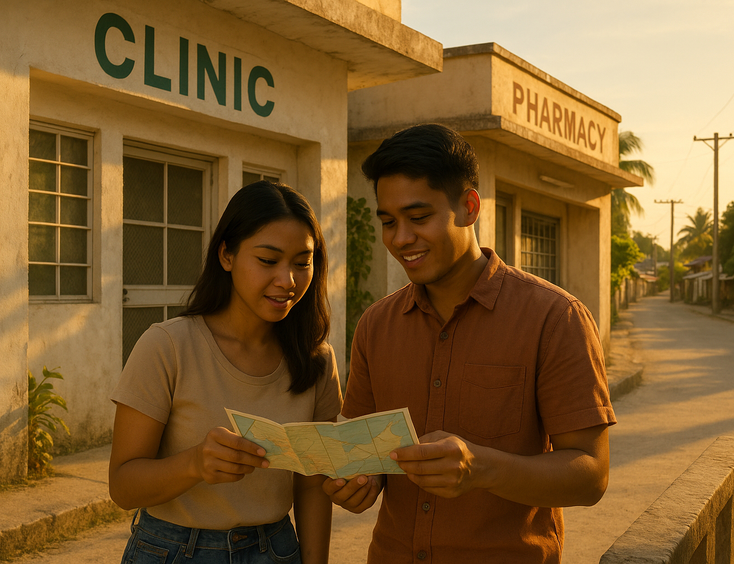
Safety & Medical - Clinics on Popular Islands

Travel feels lighter when you know where to go if something stings, scrapes, or simply feels off. Here’s a calm, couple-friendly guide to clinics and care on the most-visited islands—plus smart packing, when to self-manage, and when to head in.
Quick map of care by island
Palawan (El Nido & Coron)
Town clinics handle routine issues; private doctors and small hospitals sit in the main hubs. Boat days end earlier here—use that window for quick checks before pharmacies close.
Boracay
Multiple clinics and 24-hour pharmacies serve White Beach and the backroads. Minor beach injuries are common; rinse thoroughly and let a nurse assess deeper coral scrapes.
Bohol & Panglao
Clinics near Alona and along the main road handle ear infections, upset stomach, and reef cuts; bigger facilities sit on the Bohol mainland.
Cebu South (Moalboal/Badian)
Expect small roadside clinics and access to larger hospitals back in the city; canyon guides can advise on best times to visit (mornings move faster).
Siargao
General Luna has basic clinics; more complex cases route to Surigao City. Keep one “land day” for checks if you’ve had a long boat run or a fall on the rocks.
Siquijor & Camiguin
Provincial hospitals plus town clinics; plan visits for daylight and bring cash plus IDs.
Tip: save your stay’s front-desk/concierge WhatsApp number; they’ll know the fastest open clinic that day.

What to pack in a couple’s med kit
- Reef-safe sunscreen, lip balm with SPF, after-sun aloe
- Oral rehydration salts, anti-diarrheals, antihistamines
- Motion-sickness tabs, basic pain/fever meds
- Antiseptic solution, saline wash, steri-strips, waterproof bandages
- Small tweezers (for urchin spines), vinegar sachets, hydrocortisone cream
- Ear drops if you’re swimming daily; insect repellent and bite soother
- Copies of prescriptions, allergy list, and insurance details
Common island hiccups and first steps
| Situation | First step | Go to a clinic if… |
|---|---|---|
| Coral scrape | Rinse with saline, disinfect, cover | It’s deep, won’t stop oozing, or shows redness after 24–48h |
| Jellyfish sting | Rinse with seawater, then vinegar; no rubbing | Pain spreads, breathing changes, or you feel dizzy |
| Sun/heat fatigue | Shade, cool fluids, ORS | Vomiting persists, confusion, or fainting |
| Ear pain after swims | Dry ears, rest from submersion | Sharp pain, fever, or discharge |
| Stomach upset | Hydrate with ORS, bland food | Blood, high fever, or >48h symptoms |
This is general guidance—always follow local medical advice.

When you need help same-day
- Ask your hotel to call ahead so you don’t wait twice.
- Bring cash, a photo ID, and your insurance info.
- If you’re juggling boats and vans, handoffs are simpler with detail-minded coordinators who know the local routes.
- If mobility is tricky, line up private wheels with room for bags and a cooler so you can stop at a pharmacy, clinic, then back to your stay without haggling.
Dive, canyon, and boat-day safety
- Start early: calmer seas, cooler temps, shorter queues.
- Wear reef shoes on rocky entries; avoid stepping on coral.
- For water photos or aerial add-ons, choose calm windows and safety-first crews—supplier tips live in this friendly guide to underwater and drone sessions that play nice with the rules.
- If forecasts wobble, keep buffers and refundables; insurance basics and reroute ideas sit in the storm-season playbook.
Pharmacies and payments
- Bring small bills for island fees and quick purchases; ATMs cluster in town centers.
- Screenshot your hotel’s address and the clinic pin—signal can dip on coves.
- If the resort spa is booked but you need gentle recovery (magnesium soak, light massage), look for on-call wellness therapists who come to your villa.

Paperwork and peace of mind
- Photograph passports, policy pages, and prescriptions; store offline.
- Ask your provider about coverage for boat delays, cancellations, and medical visits.
- To avoid sprinting between terminals, build routes around short crossings and dawn flights—the logistics primer on hops and private transfers that keep timing tidy can spare you the scramble.
A calm plan for “just in case”
- Save your stay’s manager and a nearby clinic in your contacts.
- Keep one flex afternoon for checks after heavy activity days.
- Carry a daypack: water, ORS, bandages, insect patches, copies of IDs.
- Agree on a signal—if one of you says “pause,” sit, shade, hydrate, reassess.
For month-by-month sun windows, budgets, and how clinics fit into sensible routes, zoom out to the big-picture planner inside the Philippines honeymoon guide. Health is the foundation; the romance is everything you stack on top—sunset walks, quiet dinners, and the way you look after each other.
Find Your Perfect Wedding Supplier Today!
Discover trusted wedding suppliers across the Philippines in our complete directory. Compare services and connect with the ones that fit your dream celebration.
Browse Wedding Suppliers



